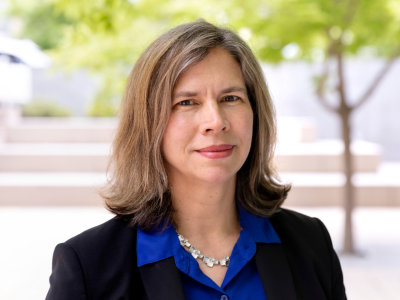By Gwyneth K. Shaw
Professor Andrea Roth, a groundbreaking scholar of criminal law and evidence in an increasingly technology-driven world, has been awarded the Barry Tarlow Chancellor’s Chair in Criminal Justice — a position created by a $5.5 million gift to Berkeley Law from the legendary defense lawyer’s estate in December 2022.

Roth says she’s thrilled to carry the namesake of Tarlow, a giant in criminal justice, particularly in California. He co-founded California Attorneys for Criminal Justice and was known for being not only a fierce advocate but a scholarly presence in the state bar who trained and helped so many others, she says.
“It’s an incredible honor, and even more so to be associated with Barry Tarlow and his family,” says Roth, who joined the faculty in 2011. “As one attorney put it in a recent tribute to Mr. Tarlow, he was ‘never satisfied with what could be done better.’ I hope to live up to that legacy in my own work.”
Dean Erwin Chemerinsky says he can’t think of a better person to hold a chair named for Tarlow.
“It is wonderful that Andrea Roth will be the first holder of the Barry Tarlow Chair in Criminal Justice,” he says. “Andrea is a superb teacher and a great scholar in the areas of criminal law and procedure. An endowed chair is the highest honor a university can bestow and Andrea is so deserving of this recognition.”
Analyzing the intersection of evidence and science
Roth earned a B.S./B.A. in math and political science at the University of New Mexico and a J.D. from Yale Law School. Before joining Berkeley Law’s faculty, she spent nine years as a public defender in Washington, D.C., and three years as a Grey Fellow at Stanford Law School.
She teaches Criminal Law, Criminal Procedure, Forensic Evidence, and Evidence, and is a faculty co-director of the Berkeley Center for Law & Technology. She also chairs UC Berkeley’s Committee on Teaching and is an elected member of the American Law Institute. In 2017, before gaining tenure, Roth received the campus-wide Prytanean Faculty Award, given to one pre-tenure woman faculty member to recognize her excellence in scholarship and mentoring.
Her interest in how science and evidence intersect goes back to her days as a public defender, when she was a founding member of a forensic practice group that studied and litigated forensic DNA typing.
She’s in her last year of a three-year term as chair of the National Institute of Standards and Technology’s legal advisory group on forensic science, and has written extensively about the ways science- and technology-based evidence is reshaping the criminal justice system.
Her 2019 California Law Review (CLR) article “‘Spit and Acquit’: Prosecutors as Surveillance Entrepreneurs” revealed how the Orange County prosecutor’s office was using plea deal offers to entice defendants charged with misdemeanors to give a DNA sample for a permanent database; the article helped inspire a legal challenge that is now on appeal.
She also writes on broader criminal justice issues, such as a 2022 Duke Law Journal article and a 2024 CLR article arguing for a right to jury and lawyer, respectively, in “all criminal prosecutions” — the language of the Sixth Amendment. Roth co-authored a popular Evidence casebook and is working with the Advisory Committee to the Federal Rules of Evidence this spring to help develop new rules for machine-generated proof.
‘She’s really just that good’
Roth is also a star in the classroom: She won the law school’s Rutter Award for Teaching Distinction in 2016 and the UC Berkeley Distinguished Teaching Award in 2019, and has also received teaching awards from the Berkeley Journal of Criminal Law and Women of Berkeley Law.
Carlisle Boyle ’25 took Roth’s Criminal Law course in her first semester as a 1L and considers herself lucky to have had it as her “small mod” section, which provided the opportunity to really get to know Roth.
“Since then I’ve taken nearly every other class she’s offered — she’s really just that good,” Boyle says. “I couldn’t have asked for a better professor to guide us through our first semester of law school: She’s able to teach case law and doctrine so clearly and methodically that information that started completely foreign to you begins to fit together like puzzle pieces in your brain.”
Roth is engaging and funny and makes even nitty gritty legal doctrines feel approachable, Boyle adds, while never losing sight of the tangible impact the criminal legal system has on individuals and communities.
“She empowers students to think critically about the criminal legal system and how it could be changed (or dismantled entirely),” Boyle says. “Professor Roth is also so welcoming during and outside of class — her office hours are always a warm, comfortable space to work out whatever legal concept is perplexing you or just chat about careers and life in the law.
“It’s really no surprise she’s one of the most loved professors at Berkeley Law.”
With California at the forefront of criminal justice reform efforts, Berkeley Law continues to expand its already impressive bench in the field. Last year, former San Francisco District Attorney Chesa Boudin joined the school as the founding executive director of the Criminal Law & Justice Center, which is already hosting important conversations about the movement’s next steps.
“It’s an exciting time to be part of criminal justice at Berkeley, because of our uniquely brilliant and service-minded students, Berkeley’s public mission, and our position in a reformist state,” Roth says. “We also have a particularly eclectic criminal faculty: former prosecutors, former defense attorneys, criminal law theorists, international criminal law experts, crimmigration experts, and also economists and sociologists working on criminal law-adjacent projects.
“I feel so lucky to be a part of it.”